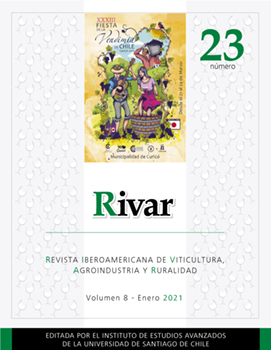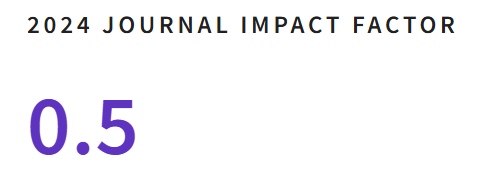The Chacolí de Doñihue Festival: Historical and Cultural Analysis of a Celebration (1975-2020)
DOI:
https://doi.org/10.35588/rivar.v8i23.4795Keywords:
chacoli, Doñihue, Chile, festival, Intangible Cultural HeritageAbstract
This article examines the origin and development of the Chacolí de Doñihue Festival, in the O’Higgins Region, from its first version in 1975 to the present. The existence of three different moments of the celebration is verified, with a change of focus and significance, from a civic festival associated with a colonial type of sacralizing legitimation (1975-1977), passing through a period where the figure of the chacolí, mainly, through the exclusion of the chacoliceros, lost importance (1978-2016), and a third moment (2017-2019) in which the festival was reconfigured by external intervention and acquired festive dyes of a productive nature associated with the harvest around the figure recovered from the chacolí. The article asks the reason for the oscillation of the figuration of the chacolí in the party that bears his name. It is concluded that this had to do with the real character of the festival and the equivocation of the name: the festival was created to honor the communal anniversary, not the chacolí. To carry out the analysis, the press of the O’Higgins Region is used as a source, from 1975 to 2020, as well as reference photographic material of the celebrations held between 2017 and 2019.
Downloads
References
Bourgault, P. (2015). Vinos insólitos. Madrid, Jonglez Photo Books.
Castro, A; Mujica, F. y Cussen, F. (2017) “Chamantos y mantas corraleras de Doñihue: ascenso y consolidación de un textil con DO. (1917-2016)”. Revista RIVAR 4(11): 4- 30.
Cid, G. (2013). “Nacionalizando memorias periféricas: conmemoraciones y nacionalismo chileno en las regiones de Antofagasta y Tarapacá, 1879-1910”. História Unisinos 17(3): 214-225.
____. (2008). “Nacionalizando la ‘segunda independencia’ chilena. Fiestas y discursos cívico-religiosos en torno a la guerra contra la Confederación, 1836-1851”. Bicentenario. Revista de Historia de Chile y América 7(2): 5-33.
Chile es Tuyo (2018). “Fiesta del Chacolí”. Chileestuyo.cl. En https://www.chileestuyo.cl/eventos/fiesta-del-chacoli/ (consultado 04/05/2021).
Cruz, I. (2003). “Tiempos fabulosos y mito de origen: festividades de Estado en Chile entre la Colonia y la República”. En O’Phelan, S. et al. (coords.). Familia y vida cotidiana en América Latina, siglos XVIII-XX. Lima, IFEA-PUCP: 15-49.
Duhart, F.; Mujica, F. y Lacoste, P. (2020). “Chacolíes: Light Wines and Strong Identities in North-West Spain and South America”. Inédito.
Echaíz, R. (1975). Historia de Santiago. Tomo II. La República. Santiago de Chile, Imprenta Ricardo Neupert.
Espina, N. y Rojas, G. (2015). Relación histórica sobre la vitivinicultura en la Provincia de Cauquenes. Santiago de Chile, Sociedad Editorial Némesis.
Fiestas Costumbristas (2018). “Fiesta del Chacolí en Doñihue”. Identidad y futuro. En https://identidadyfuturo.cl/2018/07/03/fiesta-del-chacoli-en-donihue/ (consultado 04/05/2021).
Garavaglia. J. (2000). “A la Nación por la fiesta: las Fiestas Mayas en el origen de la Nación en el Plata”. Boletín del Instituto de Historia Argentina y Americana “Dr. Emilio Ravignani” 22: 73-100.
García, I. (2016). “Las fiestas de los trabajos, los productos y los quehaceres regionales”. En Florescano, E. y Santana, B. (coords.). La Fiesta Mexicana. Tomo II. México DF., Fondo de Cultura Económica: 93-114.
Godoy, M. (2012). “Fiestas, construcción de Estado Nacional y resignificación del espacio público en Chile: Norte Chico, 1800-1840”. Cuadernos de Historia 37: 51-73.
González, M. (2011). Fiestas y Nación en América Latina. Las complejidades en algunos ceremoniales de Brasil, Bolivia, Colombia, México y Venezuela. Bogotá, Panamericana.
Lacoste, P. (2020). “Vino, fiesta y vendimia en Chile (1930-1970)”. Artículo elaborado en el marco del proyecto 031894LG Dirección de Investigación Científica y Tecnológica (DICYT) de la Vicerrectoría de Investigación. Desarrollo e Innovación (VRIDEI) de la Universidad de Santiago de Chile. Inédito.
Lacoste, P.; Briones, F.; Cussen, F.; Soto, N.; Rendón, B.; Mujica, F.; Aguilera, P.; Cofré, C.; Núñez, E. y Lacoste, M. (2015). “Vinos típicos de Chile: ascenso y declinación del chacolí (1810-2015)”. Idesia 33(3): 97-108.
Lacoste, P.; Castro, A.; Mujica, F. y Lacoste, M. (2017). Patrimonio y desarrollo territorial. Santiago de Chile, IDEA-Universidad de Santiago de Chile.
Mó, F. (1979). Vitivinicultura. Buenos Aires, Depalma.
Muir, E. (2001). Fiesta y rito en la Europa Moderna. Madrid, Complutense.
Mujica, F. (2017). “Chacolí de Doñihue”. En Lacoste, P.; Castro, A.; Mujica, F. y Lacoste, M. Patrimonio y desarrollo territorial. Santiago de Chile, IDEA-Universidad de Santiago de Chile: 204-216.
Mujica, F.; Adunka, M.; Lacoste, P.; Castro, A.; Muñoz, J. y Martínez, F. (2017). “Jamón de Chiloé: itinerario histórico de un producto típico de América del Sur (siglos XVIII y XIX)”. Cuadernos de Historia 46: 55-82.
Ortemberg, P. (2006). “Las primeras fiestas cívicas en el Perú independiente: emblemática y ceremonial bajo el Protectorado”. Revista Andina 43: 239-268.
Ortiz, E. y Paredes, R. (2013). Sabores regionales. Santiago de Chile, ATG.
Peralta, P. (2017). ¡Chile tiene fiesta! El origen del 18 de septiembre (1810-1837). Santiago de Chile, LOM.
Ricci, M. y Abello, L. (2012). Joyas de Doñihue y la R.N. Roblería del Cobre de Loncha. Rancagua, Conaf.
Salinas, M. (2007). Vamos remoliendo mi alma. La vida popular en Santiago de Chile 1870-1910. Santiago de Chile, LOM.
Salvador, JM. (2001). Efímeras efemérides. Fiestas cívicas y arte efímero en la Venezuela de los siglos XVII-XIX. Caracas, Universidad Católica Andrés Bello.
Unwin, T. (2001). El vino y la viña. Barcelona, Tusquets.
Valenzuela, J. (2014). Fiesta, rito y política. Del Chile borbónico al republicano. Santiago de Chile, DIBAM-Centro de Investigaciones Diego Barros Arana.
Zárate, V. (2016). “Las fiestas civiles en el siglo XIX”. En Florescano, E y Santana, B. (coords). La fiesta mexicana. Tomo I. México DF., Fondo de Cultura Económica: 207-221.









